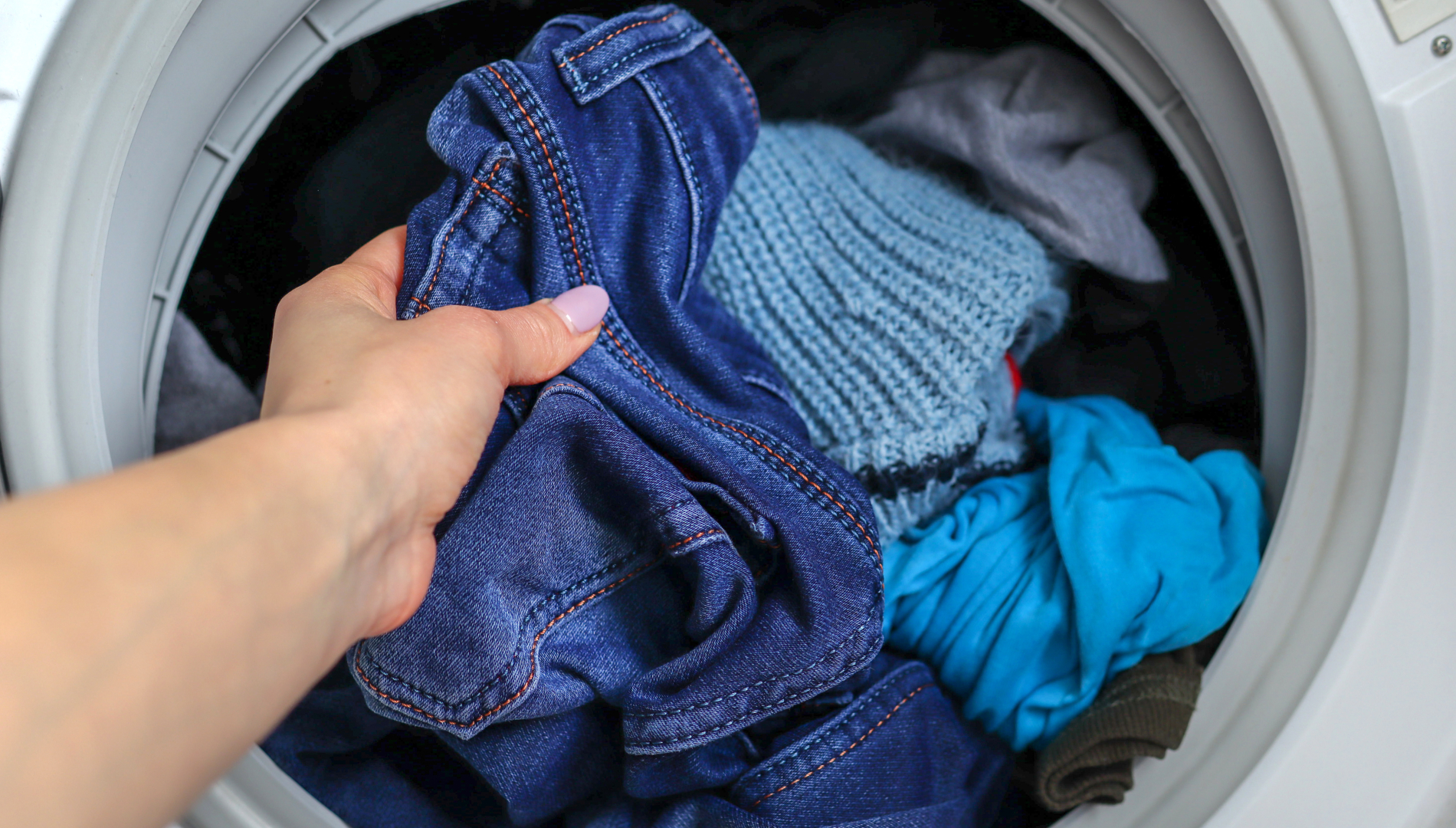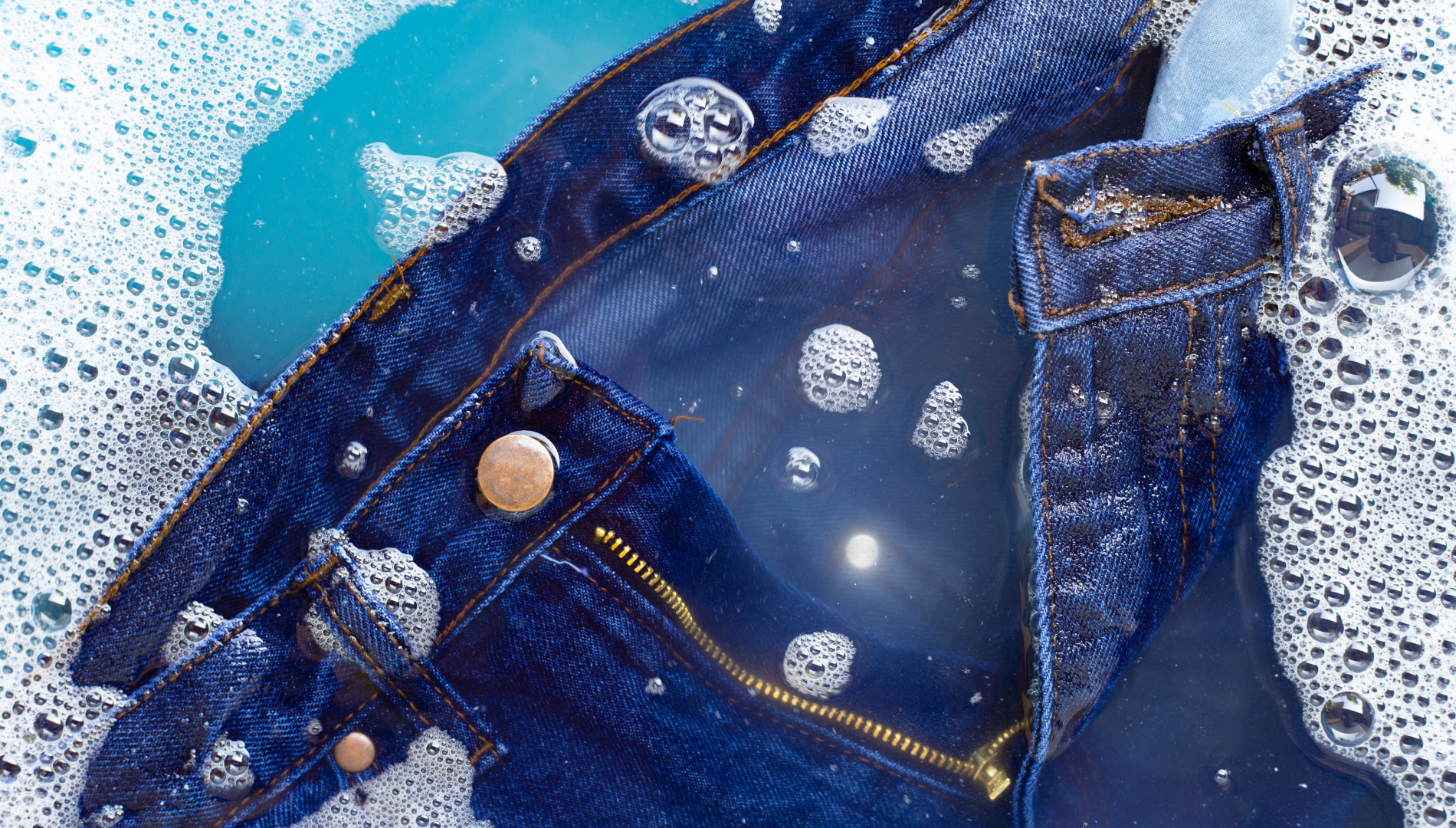Do jeans shrink in the dryer? We've asked the experts
If you’re wondering if jeans shrink in the dryer, we’ve done the research and consulted the experts to get the lowdown on the best way to take care of your jeans to make sure they last a lifetime

Parenting advice, hot topics, best buys and family finance tips delivered straight to your inbox.
You are now subscribed
Your newsletter sign-up was successful
Unlike your standard laundry pile, jeans can be a lot more complicated. Do jeans shrink in the dryer is a question that crops up numerous times with many wondering if you should even wash them in the first place.
Whilst some people may fling their best jeans in the wash every week, others choose to carefully hand-wash and air-dry them. Some might even decide to not wash them at all, using the old stick them in the freezer method.
Much like whether you prefer wearing black jeans, a loose mom fit or a skinny style, it all comes down to perfect preference. However there is one thing we can agree on, no-one wants to open the tumble dryer to a shrunken pair of jeans especially when so many of us take the time to find the perfect fit.
So if you’re wondering if jeans shrink in the dryer, we’ve done the research and consulted the experts to get the lowdown on the best way to take care of your jeans to make sure they last a lifetime.
Do jeans shrink in the dryer?
Potentially yes. The more heat your jeans are exposed to, the higher chance of shrinkage so choosing to air dry your jeans is a much safer option.
Toby Standing, stylist of Thread says, "Drying denim can shrink your jeans up to 15 per cent. Obviously, every product is different, but generally, of all the methods that can be used to wash denim, the dryer appeared to be the biggest risk when it came to sizing."
We know air-drying can take considerably longer so if you’re pushed for time and want to use a dryer, you can put your jeans in a low or no heat cycle and use dryer balls too.
Parenting advice, hot topics, best buys and family finance tips delivered straight to your inbox.
Washing machine pros Whirlpool recommend you remove the jeans whilst they are still slightly damp, give them a good shake and stretch and then finish them off by hanging to air dry.
Once your jeans have fully dried you can fold them up and store them in your wardrobe or drawer.
What’s the best way to wash jeans?
Most jeans will be fine on a gentle, cold cycle in the washing machine but always check the care instructions label before you start washing or drying your jeans. Denim may seem like a durable fabric but it will benefit from a more delicate wash.
Experts Whirlpool also advise turning your jeans inside out to protect the fibres and prevent fading from the detergent.
It’s also worth noting how often you should wash your jeans. Whilst other wardrobe basics such as t-shirts may need washing after one or two wears, jeans should only be washed every 10 or so wears. Not just to keep them in tip-top condition, but to help the environment too. By washing your jeans every 10 wears rather than two, we can reduce water usage and climate-change impact by up to 80%.
If you're keen to wash your jeans less, but want to keep them looking fresh you can try freezing them instead.
"This is an eco-friendly way of cleaning your jeans- they don't get less dirty, but the smell is eradicated and they don't lose their shape and colour. Obviously you can freeze-clean jeans as often as you'd like without damaging the denim. But if you're hell-bent on washing your jeans in a machine, wait four to six months if you can stand it," says Toby.

How to prevent jeans shrinking
To prevent jeans from shrinking you want to avoid any hot temperatures. Too much heat is the biggest culprit when it comes to jeans shrinking so steer clear of any high heats during washing and drying. This means putting your jeans on a cold wash and air-drying them or on a low-heat cycle in the dryer. Try to avoid any heavy cycles and keep it on a delicate wash too.
According to Whirlpool, fibre, temperature and agitation cause shrinkage, they state: “When cotton, linen and some synthetic fabrics are made, their fibres are pulled, stretched, twisted and stressed. Washing and drying these fabrics let the fibers relax, returning them to their pre-shrunken state.”
Of course, if your jeans have become slightly loose through numerous wears, you may want them to shrink slightly for a tighter fit. But just be careful not to overdo and make them too tight through repeated washes.
Can you unshrink denim?
Yes, it’s possible to unshrink denim thanks to some clever tried and tested techniques if your favourite pair is suddenly feeling a bit snug post-wash.
The easiest thing to do is to spritz the jeans with water - particularly in the areas that feel smaller such as the waistband and the calves. Once the fabric is suitably damp, you want to stretch the fibres back out so start pulling in all directions to reshape the jeans.
"On a case by case basis, it can be done. Obviously, there are severe circumstances in which the shrinking of a product isn't reversible, but often you can at least stretch the trousers out - if only a little. Try spraying the product with some lukewarm water. Get the area you plan to stretch out fairly damp and begin to pull the product. Repeat the process a few times, until it feels it's working effectively," explains Toby.
Finally, hang them out to air dry. Do not attempt to put them back in the offending dryer.
Should you dry clean jeans?
Yes, you can dry clean your jeans if you’re worried about washing them yourself. Dry cleaning is an easy way to avoid shrinkage and keep your jeans in tip-top shape.
Gentler on denim, dry cleaning uses solvents instead of soap and water to get rid of dirt and grime.
Dry cleaning experts also have a lot of experience working with sensitive fabrics so your jeans will certainly be in safe hands. Although it’s more expensive than washing at home, if you’ve splurged on a fancy pair of jeans you’ll be saving money in the long run.